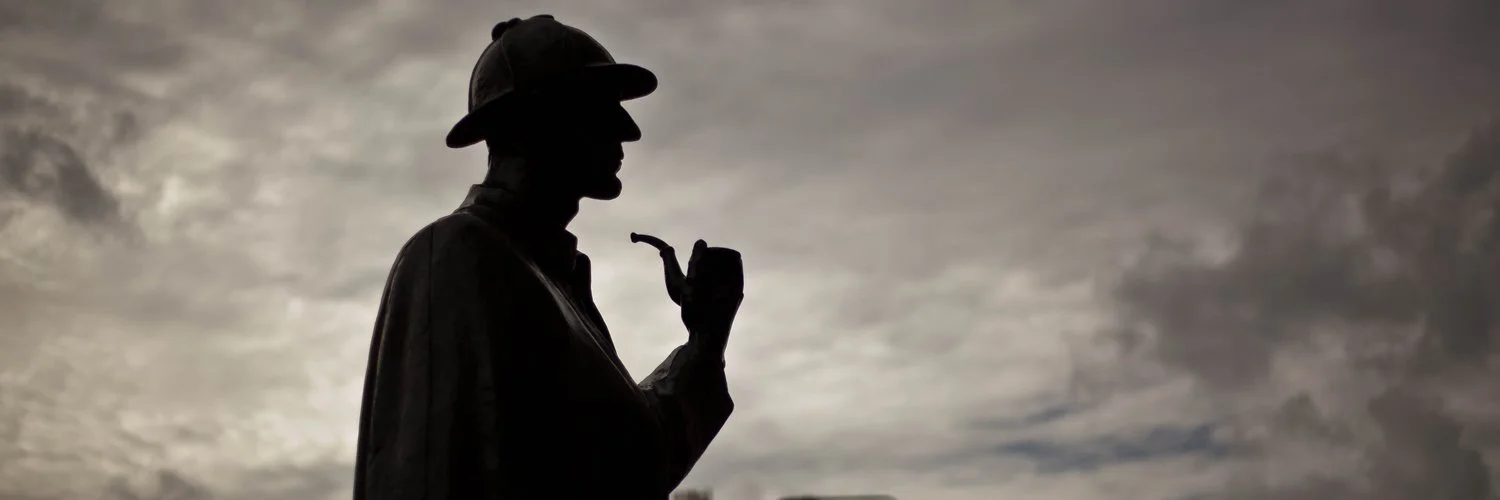Before I started to write The Spy Devils, I read/listened to dozens of espionage and other thrillers. I wanted to learn what made the main characters what they were. I wanted to understand if there were common characteristics. Answer? Yes and no, as you might expect. At the very least, I was exposed to some excellent writing.
I read other genres to explore those characters similarly. Looking at them all, I incorporated characteristics of these great characters in the Spy Devils series.
Here are a few. Maybe you can recognize them in the Spy Devils series.
Sherlock Holmes
I consider Holmes the greatest, most iconic fictional character of all time. Why? Simple answers. His legacy. People think he was real. Pop culture is still making movies and shows about him. His depth of character had only been done once Doyle created him.
He is a multifaceted character with a unique blend of characteristics. He is a brilliant detective with exceptional deductive reasoning skills, but he is also portrayed as eccentric, aloof, and sometimes socially awkward. This complexity makes him intriguing and relatable to a wide range of readers. About every true crime and detective story that followed has elements of the Holmes character.
I see a flawed genius in Holmes and his stories, not a superhero. He knew everything, but you didn’t know that until he needed it. He also has Moriarty, a protagonist who is as engaging as Holmes. He has complex motives. We want to learn more about both of them.
Doyle sort of created the idea of iconic phrases. “Elementary.” “The game is afoot.” and the even more iconic “When you have eliminated the impossible, whatever remains, however improbable, must be the truth.”
I like the idea of an aloof genius.
James Bond
James Bond was a new kind of spy hero and a departure from the traditional, stoic, and one-dimensional spies of the time. His charismatic and carefree personality and sophistication, with a touch of wit and humor, made him an instantly recognizable and relatable character. His dry sense of humor and his penchant for stylish living made him stand out and added depth to his character.
He is a skilled and often ruthless spy. Still, he is not without his flaws and vulnerabilities, including his struggles with relationships, which add depth to his character and make him more relatable to readers.
I knew I needed these personality pieces in some of my characters.
George Smiley (Okay, he is a thriller/espionage character, but of a different style and time.)
In contrast to Bond, George Smiley is a profoundly complex and multifaceted character. And, unlike the glamorous and action-oriented spies depicted at the time, he lives in a more realistic, nuanced, and morally challenging world of espionage. He is intelligent, introspective, and has emotional depth.
He is an ordinary-looking, unassuming older man who relies on his intellect, analytical skills, and understanding of human nature to succeed. Smiley often navigates morally ambiguous situations in the morally murky world of espionage. His inner conflict and ethical dilemmas create a character who embodies the complexities and moral challenges of the spy profession.
I like Smiley because he evolves in response to changing circumstances and challenges, adding depth and authenticity to his non-superhero appeal.
Phillip Marlow/Sam Spade
Hard-boiled detectives Sam Spade and Philip Marlowe set the tone for a new type of detective fiction that featured tough, cynical, and morally ambiguous protagonists. They marked a significant departure from genteel, amateur detectives.
They are self-reliant, witty, sarcastic, and rugged. Cynical. Tough. They are independent and don’t feel bound by the constraints of authority. They often engage in complex, tumultuous relationships with other characters in their stories, often including love interests and antagonists.
I like Spade and Marlowe as they operate in a world where right and wrong are not always clear-cut, and they have shades of gray for their morally complex characters.
Edmond Dantès
Okay. I know he isn’t a “thriller” character, but he is a great character from one of my favorite books—The Count of Monte Cristo—perhaps the book I have read the most.
Dantès, like the characters above, undergoes a transformational change. He becomes a multifaceted character with a blend of moral ambiguity and depth. His ability to adapt, learn, and become self-reliant and resourceful makes him intriguing.
He is a good and bad guy. A mysterious, avenging angel. All-powerful figure. He uses disguises and elaborate schemes. Manipulating events to achieve his goals—no matter what. While understandable to some extent, his actions raise questions about the ethics of revenge, justice, and the consequences of one's choices.


